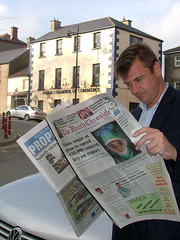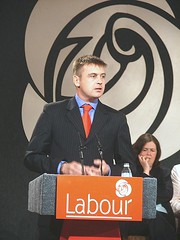Sunday, November 01, 2009
Action Needed on Vulture Funds
Last week the Debt and Development Coalition of Ireland came before the Foreign Affairs Committee. The aim was to update us on progress in relation to a Justice Centered Irish debt policy.
The Coalition suggested six recommendations for action. These included one particular issue in relation to the existence of Vulture Funds. These funds buy up sovereign debt of poor countries, often paying very little for the “face value” of the debt, and then chase the countries for payment of the full amount. There have been some atrocious incidences in recent years. At the Committee I brought up the example of one Vulture Fund, Donegal International.
The story began in 1979 when the Zambian government borrowed $15 million dollars from the Romanian government. Over time the Zambians realised they could not pay and so they attempted to seek a revised payment agreement with the Romanian government. However, early in 1999, just before a deal was done, the Romanians sold off the entire debt to a private limited company called Donegal International for $3.3 million.
Over the next few years the Zambians started to pay off some of this money. By the end of 2003 they had paid off $2.4 million – 75% of what Donegal International had paid for the debt. At that stage, for various reasons, Donegal International took the Zambian government to court for the full amount owed. In 2007 The UK High Court found in their favour and awarded then $15 million.
So, for their expenditure of just over $3 million on the loan they got almost $18 million back. Of course, the Donegal International website says that the actual profit, after costs, legal fees etc., is a lot lower than this, but it’s clear that they made a fair old whack from this.
The issue was covered in depth by BBC Newsnight, and you can look at a video report here.
Their actions and their success are no doubt encouraging other vulture funds to do the same. Of course, the impact of this is that much of the debt relief that countries like Zambia are getting is just being eaten up in payments to these vultures. It has been asserted that the payment of $15 million to Donegal International meant that up to 100,000 Zambians went without medical care provision as a result.
There is some hope on the horizon. A Bill has been introduced in the States trying to get the process banned there.
In the UK, Gordon Brown is strongly against allowing such companies to use UK courts to progress claims. But the EU needs to act as well. As part of their presentation to us last week, the Debt Coalition proposed the following recommendation:
“The development of internationally binding, just and responsible financing standards by supporting efforts at EU level to curtail so called “vulture funds” from making claims in EU member state national courts”.
In order to keep pressure on at European level, I have asked our MEP, Nessa Childers, to table the following questions in European Parliament
“To ask what the current policy of the EU is in relation to the curtailment of so called “vulture funds” from making claims in EU member state national courts.”
The Coalition suggested six recommendations for action. These included one particular issue in relation to the existence of Vulture Funds. These funds buy up sovereign debt of poor countries, often paying very little for the “face value” of the debt, and then chase the countries for payment of the full amount. There have been some atrocious incidences in recent years. At the Committee I brought up the example of one Vulture Fund, Donegal International.
The story began in 1979 when the Zambian government borrowed $15 million dollars from the Romanian government. Over time the Zambians realised they could not pay and so they attempted to seek a revised payment agreement with the Romanian government. However, early in 1999, just before a deal was done, the Romanians sold off the entire debt to a private limited company called Donegal International for $3.3 million.
Over the next few years the Zambians started to pay off some of this money. By the end of 2003 they had paid off $2.4 million – 75% of what Donegal International had paid for the debt. At that stage, for various reasons, Donegal International took the Zambian government to court for the full amount owed. In 2007 The UK High Court found in their favour and awarded then $15 million.
So, for their expenditure of just over $3 million on the loan they got almost $18 million back. Of course, the Donegal International website says that the actual profit, after costs, legal fees etc., is a lot lower than this, but it’s clear that they made a fair old whack from this.
The issue was covered in depth by BBC Newsnight, and you can look at a video report here.
Their actions and their success are no doubt encouraging other vulture funds to do the same. Of course, the impact of this is that much of the debt relief that countries like Zambia are getting is just being eaten up in payments to these vultures. It has been asserted that the payment of $15 million to Donegal International meant that up to 100,000 Zambians went without medical care provision as a result.
There is some hope on the horizon. A Bill has been introduced in the States trying to get the process banned there.
In the UK, Gordon Brown is strongly against allowing such companies to use UK courts to progress claims. But the EU needs to act as well. As part of their presentation to us last week, the Debt Coalition proposed the following recommendation:
“The development of internationally binding, just and responsible financing standards by supporting efforts at EU level to curtail so called “vulture funds” from making claims in EU member state national courts”.
In order to keep pressure on at European level, I have asked our MEP, Nessa Childers, to table the following questions in European Parliament
“To ask what the current policy of the EU is in relation to the curtailment of so called “vulture funds” from making claims in EU member state national courts.”








